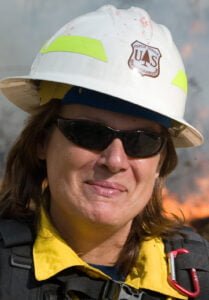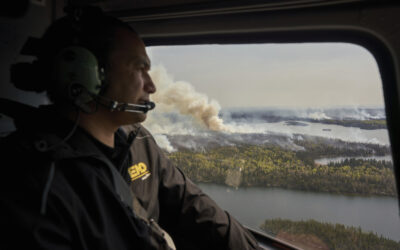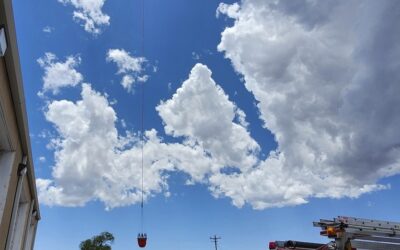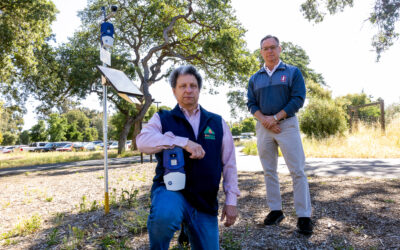This spring I’ve been to Alaska, Arizona and Washington States helping teach L-380 and L-381. I really enjoy teaching fire classes but teaching leadership is really where my heart is. Not only that, as an aging boomer, being in a classroom for a week with younger up and coming fire leaders really fills my bucket. So, there I am teaching the leadership curriculum using my stories as examples and watching the students engaging in the topic. What a great way for this old, retired firefighter to feel useful.
Driving to the class with another instructor who is younger than I but retired, I was telling him what it’s like to get old. “I can’t pretend that I’m getting old,“ I told him. As a friend reminded me, “At least you don’t have to worry about getting old anymore. You already are.”
When my friend said that, I just laughed since he and I are the same age, and we started fighting fire the same year. If you listen to many of my podcasts, it’s John who’s always there on the podcasts with me. But my younger retired firefighter friend in the car driving to teach L-381 said, “You’re in the fourth quarter.” Yes, that’s the perfect metaphor for our lives. My career spanned the second and third quarters, and now I’m in the fourth. What does any of this have to do with leadership? It’s not that complicated, but it may take me a bit to explain. Be patient.
One of the greatest pleasures in teaching young fire leaders is their desire to do well. They’re passionate about taking care of their people. They want to keep them safe and develop them so they have their own successful career. Young leaders who are enthusiastic about their people and the work are wonderful to be around. They want to learn, and they want to be seen as good leaders, too.
This spring, I’ve been around many young fire leaders from squad bosses to battalion chiefs and every position in between. I’ve enjoyed conversations with them during breaks, after the day’s class is over and even in emails following the class when I get home. They inspire and impress me. Their level of integrity is noteworthy. And why this matters will be clear shortly.
One of the points I often make during public speaking events, teaching classes, and on my podcasts is how important self-awareness is to good leadership. To me, that is one of the most critical traits to being a successful leader. How can you lead if you don’t really understand your own motivations and reactions to certain situations.
When I was a young Captain on a fulltime structure fire department, I learned what I could about leadership from watching Captain Piccard on Star Trek, The Next Generation. That was my leadership training back then.
Eventually I was sent to a few leadership classes, but they didn’t talk much about self-awareness. And back then I was an immature leader. Immature leaders behave and lead in a certain way based on their own insecurities and a lack of understanding of the motivations of their firefighters and themselves. It’s important to take time to decide what your values are and how that’s going to influence how you treat people and communicate with them. And to really know your values, you have to do some self-introspection to understand yourself better.
When I was in the third quarter of my career, I had a much better understanding of my values and how I wanted to treat people. How I should communicate with my staff and personnel. I had long ago decided that I would speak honestly to the “troops” when addressing their work, pay, and the agency we worked for.
I toed the company line, but I wouldn’t lie about the reality of our work either. If a Captain asked me a question in front of my boss and I knew what the boss wanted me to say and it was something contrary to what I knew to be true and honest, I told the truth. My bosses weren’t always delighted with my honesty.
The higher in an organization you rise, the more times you’ll be under pressure to not speak your truth. It’s compromising your integrity. And once you start sliding down that slippery slope, it’s nearly impossible to get back up. From my observations, the more you don’t answer with integrity, the more you compromise your values and the more you just stay silent on important issues, the easier it becomes. And I see many third and fourth quarter leaders comfortably not speaking truth to power.
Speaking truth to power means you speak the hard truths and opinions that are unpopular and risky. You might pay a price for being that person who always speaks up and lets the emperor know that they’re not wearing any clothes. It can be uncomfortable and risky for your career. But it is also risky if you just nod and go along with bad direction and policy.
Now, I’m not saying you have to argue every time a policy you disagree with comes down the pipeline. Don’t just get caught up in “sport bitching.” (See a previous column for that topic.) But when the time is right and the issue is critical, speak your truth to power.
This topic comes to mind as I watch the federal wildland fire agencies get twisted up like pretzels. It’s a mess. We’ve watched crews, engines and IMTs dispatched to fires all winter in the southwest. And it’s only going to get worse as the regular summer weather patterns set in. California’s fire season is already in action, months ahead of schedule. Look at the national predictive services map for the expected fire activity this summer. The Northern Rockies and the Pacific Northwest are predicted to get hammered. By August it could be one more season of devastation with disjointed, dismantled agencies trying to respond.
Where are our mature third and fourth quarter fire leaders right now? Who’s speaking truth to power on behalf of the public and firefighters? Are our federal wildland fire brothers and sisters going to be staffed, trained, and ready to roll? Are the IMTs going to be fully staffed? Will the local and state fire agencies who depend on mutual aid from the federal government going to receive the necessary and expected level of response? Are communities and lives going to be at risk this summer? Are they already?
The third and fourth quarter fire leaders should be speaking up. The leaders still employed appear absent. I have no doubt that fear of losing their job is foremost on their mind. And that’s a reasonable fear. But aren’t most of them already eligible for retirement? Why don’t we see leaders who resign under pressure, speak their truth to power, and explain to the American public that we will not be able to conduct critical fuels treatments without a staff to lay out timber sales, put out contracts and have field personnel to be a contract representatives. The very work that the administration is prioritizing can’t get done by a decimated agency.
I can believe that some senior leaders might believe that they need to compromise their values in order to stay employed and protect their employees. I see that as a weak excuse when in reality many are just afraid and lack the integrity to speak up. Imagine being one of those leaders who compromise their values and eventually retirees. Once retired, will they be remorseful that they didn’t speak up? Will they tell themselves that they did as much as they could considering the crazy state of affairs? Do you stand on principle and possibly retire before you planned? Or do you smile and willingly go along with something you know to be wrong and dangerous?
I’ve met a few senior leaders who possess the wisdom and the strength to speak truth to power. I’m not seeing a lot of it right now coming from our federal fire leaders. There are many senior leaders who have recently retired. We need them to be visible and to speak up.
Those young leaders I spent my time with this spring, I imagine they are speaking the hard truths. What happens to leaders when they move up higher into the organization. Does fear become such an over riding motivator that you become unable to speak the hard truths?
If you’re a fire leader (and we’re all leaders), spend some time thinking about this. Because some of you will eventually become senior leaders. This is the time to have those internal conversations as well as peer to peer conversations about speaking truth to power. Don’t wait to clearly establish your values. We need strong, honest third and fourth quarter leadership now and into the future.
Now Available
Both Sides of the Fire Line is Bobbie Scopa’s uplifting memoir of bravely facing the heat of fierce challenges, professionally and personally. It’s available now.
Order from Amazon Order from Barnes & NobleReader Feedback

 Bobbie Scopa started her career as a seasonal firefighter in 1974. After graduating from Arizona State University, she went on to work in fire and natural resource management. Eventually she left the wildand agencies to work full time for a structure fire department. She finished her Masters in Forestry at NC State then went back to the US Forest Service and BLM eventually becoming the Assistant Regional Fire Director in Region 6. Bobbie has spent many years working as a type 1 and 2 Operations Section Chief. You can listen to Bobbie tell audio stories from her long career at BobbieOnFire.com. She has also recently completed her memoir titled “Both Sides Of The Fire Line”. It will be available through Chicago Review Press late summer of 2022.
Bobbie Scopa started her career as a seasonal firefighter in 1974. After graduating from Arizona State University, she went on to work in fire and natural resource management. Eventually she left the wildand agencies to work full time for a structure fire department. She finished her Masters in Forestry at NC State then went back to the US Forest Service and BLM eventually becoming the Assistant Regional Fire Director in Region 6. Bobbie has spent many years working as a type 1 and 2 Operations Section Chief. You can listen to Bobbie tell audio stories from her long career at BobbieOnFire.com. She has also recently completed her memoir titled “Both Sides Of The Fire Line”. It will be available through Chicago Review Press late summer of 2022.


